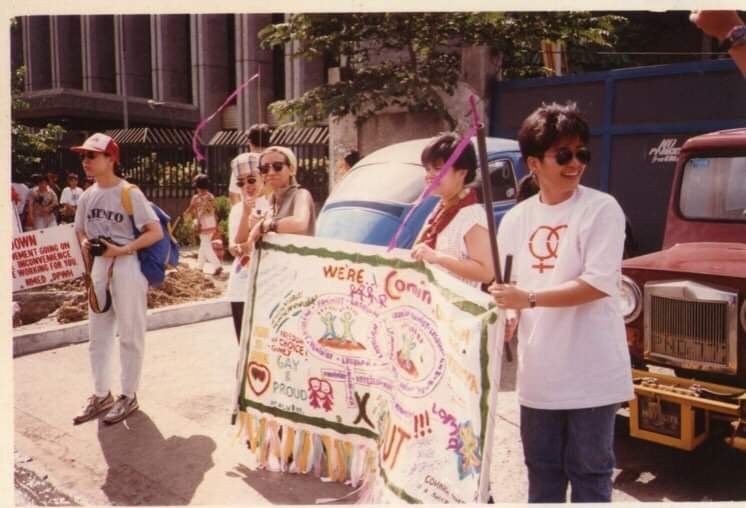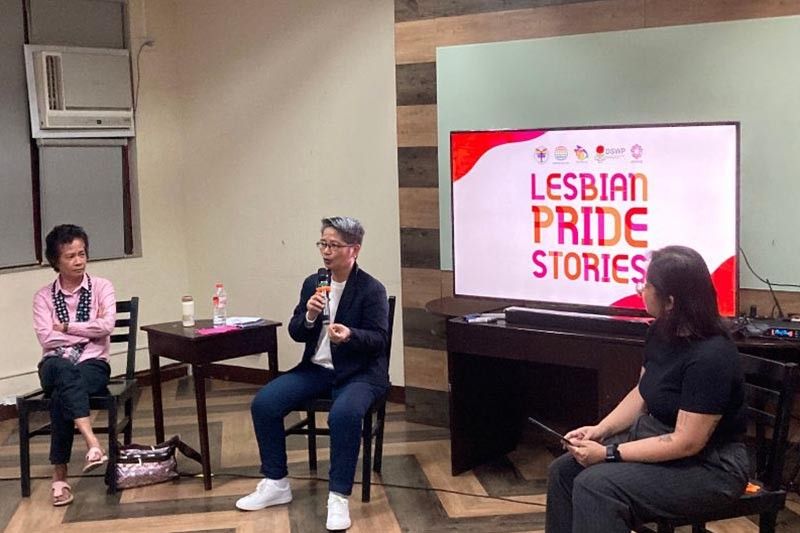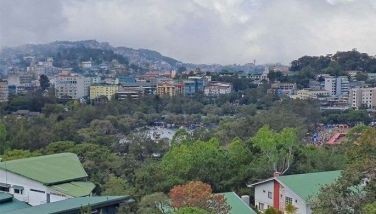30 years later: Filipinas who marched in first lesbian pride recall historic milestone

MANILA, Philippines (Updated 11:39 a.m.) — Of all places Giney Villar could have first felt the urge to speak openly about being a lesbian, few would have imagined it to be in a disco — she mused some three decades later.
Within the safe walls of Manila’s queer-coded nightclubs in the early 90s, Villar wondered for the first time in her 30s if expressions of lesbian pride and feminism would ever take place outside of nights spent steeped in alcohol.
Secretive glances among queer women during the day, many of whom were forced to wear feminine clothing, just wouldn’t cut it anymore.
“I was always waiting for Saturday nights to happen to be with my lesbian friends. For many of them, that was the only day of the week when they could wear masculine clothing and use the bathroom for men,” Villar recalled.
Speaking at “Lesbian Pride Stories,” an event commemorating the 30th anniversary of the first lesbian pride march in the Philippines last February 17, Villar said that lesbian women’s early acts of expression and pride laid the ground for lesbian women today to assert their “right to be seen.”
The event was organized by alumni of the LGBT organization UP Babaylanes at the UP College of Social Work and Community Development.
A precursor to the first Pride March in 1996
The participation of Filipino lesbian women in the International Women’s March in 1992 was deemed an "important precursor" to the first Lesbian and Gay Pride March was held in the Philippines in 1996, Villar explained.
“This was at the time novel and groundbreaking,” recounted Villar, who read a statement during the march on behalf of The Lesbian Collective, one of the earliest lesbian organizations in the Philippines.
Before Villar stepped onto the stage — which she recalled was a makeshift platform fashioned on top of a truck — the emcee introducing Villar and her group had stammered over the word “lesbian,” she recalled.
“At the time, it was still difficult even among women to say the word ‘lesbian,’ even though we were all holding a big banner proclaiming ourselves as The Lesbian Collective,” Villar said.
She spoke about the violence experienced by lesbian women at the time – an advocacy that should have resonated among women of various gender identities and political affiliations.
She recalled seeing the red flags in the crowd in Malate suddenly stop waving when she introduced herself as a lesbian woman. “It’s like time stopped. Was I doing a bad thing?” Villar said.
Lorna Israel, another member of The Lesbian Collective who helped organize the first lesbian march, said that they had to “negotiate for space” in the women’s march.
The Lesbian Collective was also threatened to be cut off from the program due to time constraints, according to Israel and Villar.
Other women’s groups, which carried banners calling to topple imperialism and other big-ticket issues in women’s rights, apparently gave them a wide berth, according to Israel.
“We were not supposed to be there at all,” Israel said.
But for the first time, Villar and Israel said, lesbian women could be seen being proud of their identity in public. It was one of the earliest and first public demonstrations where lesbian women told the public about their issues.
“It was important to claim a public space. It was important for that space to allow us to be seen, and most importantly, to be applauded,” Israel added.
To date, the LGBTQ community has been able to put up Pride March and pockets of rallies to also push for recognition of their rights. But these marches do not mean that their fight is over: Discrimination and even deadly assaults against members of the LGBTQ community continue as LGBTQ members and their allies continue to assert for their rights.

Giney Villar and Lorna Israel recall their memories of the different milestones of the lesbian movement in the Philippines at an event organized by UP Babaylan, February 17, 2023. Philstar.com/Cristina Chi
Historical relevance of discos
Villar said that before lesbian women could find the courage to organize and speak about their cause to a large crowd, queer women in the 1970s gathered in nightclubs and discos. “Dancing together with a woman secretly was considered rebellious at the time. But it was a source of strength,” Villar added.
After holding the first lesbian pride march, more queer women started to move away from watering holes in the nightlife district to holding informal study sessions to deepen their understanding of feminism and gender rights.
At the time, however, getting others to support queer activism was difficult, even among queer women themselves, Villar said.
She recalled encouraging feminist groups to release a statement that would proclaim their solidarity with queer women, but when Villar called for a meeting, only two out of ten groups showed up.
“Sometimes they had assumptions about us. I remember one of them approached us and asked questions that seemed all over the place. We got the impression they just wanted to talk to a lesbian, because at the time we seemed to be novel,” Villar said, adding that the group was often invited to explain what lesbianism was.
But the efforts of lesbian women in the early 90s to engage with others about their queer identity helped break down walls and encourage others to ‘come out’ of the closet.
“It was a big contribution to the personal life of queer women. It was considered a brave act back then to shorten your hair and wear pants,” Israel recalled.
30 years later
Thirty years after the first lesbian pride march, lesbian women in the Philippines, along with other members of the LGBTQ community, have yet to enjoy the right to marry their partner or to be protected from gender-based discrimination.
Even the sexual orientation, gender identity and expression (SOGIE) bill that merely seeks to protect against SOGIE-based discrimination in the workplace, educational institutions, healthcare facilittes and public places continues to face hurdles at the Congress.
RELATED: Villanuevas in Congress move to delay SOGIE Equality Bill
Misinformation about the bill, such as it promoting necrophilia and pedophilia and even allowing same-sex marriage, also remain rampant — a factor that could deter gaining ground and support from a larger sector of society.
Another factor that could be holding back legislation is the seeming absence of lesbian women in media and popular culture, Villar added.
“In the word LGBT, lesbian women come first. But we are possibly the last in terms of representation,” Villar said.
“Are lesbian women seen as mothers? As workers? As activists? If you’re not seen, legislators who could craft laws to protect you will not take you seriously,” Villar added.
However, despite the glaring gaps in legislation to strengthen the rights and protection of women who love other women, Villar said that there is less pressure now for women who wear masculine clothing to “soften” their looks, adding that feminists had helped to debunk misconceptions about gender over the years.
Israel said that lesbian women today can take up more space in the academe, politics and other industries without having to negotiate for their “right to exist.”
“Every time you react, you rejoice, you respond to discrimination, you create a space for yourself,” Israel addressed the crowd of mostly female students. “For lesbian women, every minute is a space-carving act.”
- Latest
- Trending
































